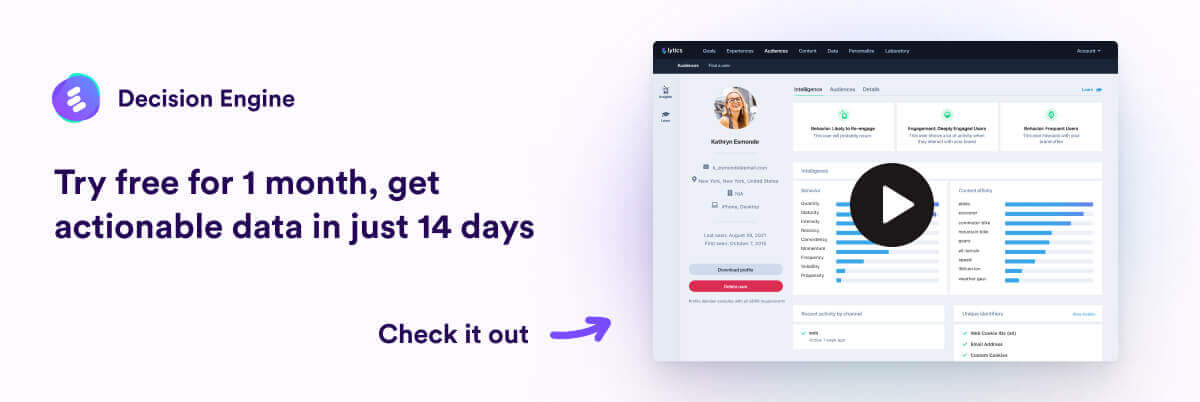5 advantages of multichannel marketing
February 8, 2022

As a marketer, you know how many different routes you can take to get more customers into your pipeline. While there are various strategies you can implement, multichannel marketing is one of the best ways to increase your ROI, boost your retargeting efforts, and extend your reach.
Multichannel marketing lets you engage with your customers and grow your brand across multiple platforms using different tactics.
What does multichannel marketing mean?
Employing a multichannel marketing strategy means that you’re consistently interacting with your customers on multiple channels: email, SMS, social media, etc. The multichannel marketing model is essential for growing a business, whether you’re running an e-commerce site or a brick-and-mortar store. It’s a strategy that lets your customers choose when, where, and how they make a purchase.
It takes six to eight interactions with your customers to generate a reliable sale, and the more channels you can reach them on, the faster you can turn a lead into a paying customer. Let’s look at a couple of multichannel marketing statistics before we move on:
- B2B campaigns that use multichannel marketing see an average of a 24% ROI increase.
- Businesses that take their marketing campaigns to at least four different channels see ROI increases of up to 300%.
5 key advantages of multichannel marketing for your business
Your customers spend time on so many channels and more and more are popping up every day. Here’s why you can’t afford to ignore multichannel marketing.
1. Extend your audience reach with multichannel marketing
The biggest problem with marketing on a single channel is that when your customers move to a new preferred channel, you lose them. With multichannel marketing, you can find and reach your leads on any channels they interact with and move with them.
Combining multichannel marketing with your customer data platform (CDP) means that you can focus on the channels that matter most to your customers and find them no matter where they go.
2. Simplify the customer journey using a multichannel marketing model
You know how important the time between your customer viewing a marketing message and making a purchase is. The longer it takes them to confirm their order, the more likely it is that they’ll talk themselves out of buying.
Multichannel marketing lets you reach your customers on the channel they prefer to shop and send them direct, relevant links. This strategy means you can send them straight from the marketing team to the sales team with little wasted time.
3. Take advantage of the benefits different channels have to offer
Every marketing channel can be perfect under certain circumstances but less than ideal in others. Using the multichannel marketing model, you can take advantage of different channels’ positive features while mitigating those situations where it falls short.
You can combine each channel you’re targeting into one multichannel marketing campaign to react immediately to any situation that arises. The only way that your brand can benefit from the positive attributes of each channel and negate their weaknesses is by using a multichannel marketing strategy.
4. Enhance the success of your retargeting campaigns through multichannel marketing
We know that retargeting is an essential part of any marketing strategy, and taking a multichannel approach can help with that, too. Offering your customers a cross-channel experience can be the determining factor between them abandoning their carts or going through with the purchase.
Customers head to checkout and abandon their carts at the last second—it happens. The key is to reach out to them while their purchase intent is at its peak. With multichannel marketing, you can utilize every channel at your disposal quickly to engage them as fast as possible.
5. Turn leads into conversions by utilizing each channel’s advantages
While multichannel marketing offers many benefits, the biggest advantage is how each channel works together during a single campaign.
For example, if you’re launching a sales campaign, you can send out emails featuring your products and then hit your customers with an SMS discount code minutes after they open it.
Or, if you’re retargeting a customer who spent some time looking but didn’t make a purchase, you can reach out on Messenger and follow up with an email offering free shipping or a discount.
All of the channels working together is the real advantage that multichannel marketing brings to the table.
7 Reasons why you can’t ignore multichannel marketing
Those five advantages are reason enough to consider taking a multichannel approach. But if you’re still unsure about whether or not it’s the right strategy for you, here are seven ways that multichannel marketing can benefit your everyday marketing efforts.
Multichannel marketing can help you:
1. Improve your customer trust
By implementing a multichannel marketing model, your customers will see your same brand messages across all of their favorite platforms, making it easier to develop a trusting, loyal relationship. Reach your customers across various touchpoints and engage them with your best content more easily with multichannel marketing.
2. Get more leads
When you’re selling a product or service, you won’t make any sales without the right leads. How do you get those leads? Through your marketing team. And the more channels they operate on, the more potential leads there are to find—and we know that more leads mean more potential sales.
3. Enhance your targeting
With all the different channels that your team can target, it simplifies the process of targeting specific customers from varying demographics and with different behaviors. Each of your leads will be more receptive to your brand through their preferred channels—some might love Facebook and social media platforms, while others might prefer email or text messages. A huge benefit of multichannel marketing is the ability to reach your target customers on the channels they use the most without missing out on those on different platforms.
4. Collect better customer data
As a marketer, you know that data is king. Collecting customer data is a job in and of itself, but there are plenty of ways to make it easier and more efficient—multichannel marketing is one of those ways. It makes sense: The more channels you operate on, the more chances you have to collect data on a wide variety of leads and customers.
5. See your ROI faster
With a good variety of channels, multichannel marketing can help you cut down on overall costs and see a faster return on investment than other strategies. Email is one of the best sales channels and can offer a high ROI by itself, but operating on additional channels is relatively inexpensive compared to the benefits that they can bring to your campaigns.
6. Heighten your brand awareness
In a world where every digital company is running campaigns on every channel imaginable, it can be a challenge for marketers to actually get their brand out there. By using the multichannel marketing model, it’s more likely that potential customers will take notice of your brand. The more often they see your content, the more easily they will recognize and remember your name.
7. Increase your customer base
Not only is multichannel marketing an effective way to increase your customer base, but it can also help you do it at a lower cost than with many other strategies. Taking your ads and content across multiple channels can help you reach a wider audience at a lower cost per acquisition than you might expect.
3 Challenges and potential drawbacks of multichannel marketing
Every marketer knows that there’s no such thing as a perfect strategy. Even though the multichannel marketing approach is bursting with benefits for just about any campaign, there can be some drawbacks.
1. It requires technical capabilities
This is especially challenging for small businesses, as they might not have the capabilities to run a multichannel marketing campaign at full force. Many marketers work together with their IT department to add, edit, and manage their content on different channels, but that’s not feasible for every organization. It’s not surprising when you look at the sheer number of channels that are available. Having all of those choices available is great, but it can be frustrating to try and take advantage of them all efficiently.
For small businesses struggling with the technical aspect of running a multichannel marketing campaign, there’s a simple solution: Start small. Start with two or three channels where the majority of your target audience is—you don’t have to advertise on every channel right away.
2. You need exceptional buyer personas
Another problem that some marketers face when working on a multichannel marketing strategy is perfecting their buyer personas. Because you use different channels to attract different customers, you might notice that you’re getting peoples’ attention but not quite closing the sale. This happens when your buyer personas aren’t exactly right for the channels you’re working on.
To combat this, spending some extra time creating and refining your buyer personas before splitting your efforts between multiple channels can help.
3. It takes from your marketing budget
The final drawback of multichannel marketing is that it does tack on additional costs, which can take its toll on your marketing budget. Most marketers would likely approach new channels, and if money wasn’t an issue, they’d start a multichannel strategy without a second thought.
The solution to this challenge also lies in buyer personas—some channels simply don’t work depending on who you’re targeting. Use your buyer personas to determine what channels your customers are most likely to engage on and focus on those rather than taking a wider approach with more channels. And remember, if you drop some channels now to focus on ROI and growth, there’s no reason you can’t pick them back up later on down the road.
Multichannel marketing: Take the first step with Lytics
A multichannel marketing strategy starts with defining buyer personas and building and segmenting better audiences. Understanding the people you’re marketing to and what they want out of your products is crucial to building a successful multichannel marketing model.
The time to start your multichannel marketing journey is now—don’t miss out on that much-needed ROI boost any longer. Try Lytics free for a month, and let us help you craft a multichannel marketing strategy that’s sure to convert.



